

Disorder: Post-Traumatic Stress Disorder - Children's Mental Health Services/REACH, Minnesota. Post-Traumatic Stress Disorder About the Disorder Children who are involved in or who witness a traumatic event that involved intense fear, helplessness, or horror are at risk for developing post-traumatic stress disorder (PTSD).
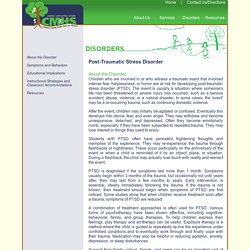
The event is usually a situation where someone's life has been threatened or severe injury has occurred, such as a serious accident, abuse, violence, or a natural disaster. In some cases, the 'event' may be a re-occurring trauma, such as continuing domestic violence. After the event, children may initially be agitated or confused. Students with PTSD often have persistent frightening thoughts and memories of the experience. PTSD is diagnosed if the symptoms last more than 1 month. A combination of treatment approaches is often used for PTSD. Support from family, school, friends, and peers can be an important part of recovery for children with PTSD. Trauma model of mental disorders. Trauma models of mental disorders (alternatively called trauma models of psychopathology) emphasize the effects of psychological trauma, particularly in early development, as the key causal factor in the development of some or many psychiatric disorders, or a vulnerability for depression and anxiety,[1] in addition to trauma as an adult as in posttraumatic stress disorder.
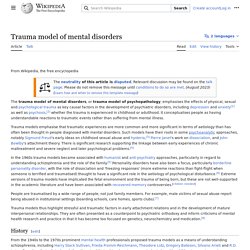
Trauma models are typically founded on the view that traumatic experiences (including but not limited to actual physical or sexual abuse) are more common or more serious than thought in the histories of those diagnosed with mental disorders. Such models have traditionally been associated with psychoanalytic approaches, notably Sigmund Freud's early ideas on childhood sexual abuse and hysteria.
In the 1960s trauma models also became associated with humanist and anti-psychiatry approaches, particularly in regard to understanding schizophrenia and the role of the family. [unreliable medical source?] History[edit] Rape trauma syndrome. Rape trauma syndrome (RTS) is the psychological trauma experienced by a rape victim that includes disruptions to normal physical, emotional, cognitive, and interpersonal behavior.
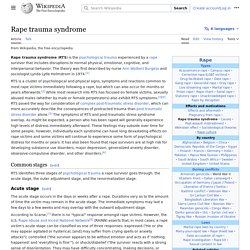
The theory was first described by psychiatrist Ann Wolbert Burgess and sociologist Lynda Lytle Holmstrom in 1974.[1] RTS is a cluster of psychological and physical signs, symptoms and reactions common to most rape victims immediately following and for months or years after a rape.[2] While most research into RTS has focused on female victims, sexually abused males (whether by male or female perpetrators) also exhibit RTS symptoms.[3][4] RTS paved the way for consideration of complex post-traumatic stress disorder, which can more accurately describe the consequences of serious, protracted trauma than posttraumatic stress disorder alone.[5] The symptoms of RTS and Post-Traumatic Stress Syndrome overlap.
Common stages of RTS[edit] Is Trauma Genetic? Scientists Say Parents Are Passing PTSD to Kids. Traditionally, psychiatrists have cited family dynamics to explain the vicarious traumatization of the second generation.
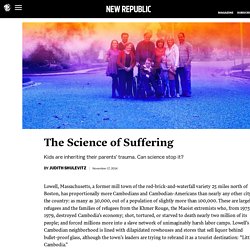
Children may absorb parents’ psychic burdens as much by osmosis as from stories. They infer unspeakable abuse and losses from parental anxiety or harshness of tone or clinginess—parents whose own families have been destroyed may be unwilling to let their children grow up and leave them. Parents may tell children that their problems amount to nothing compared with what they went through, which has a certain truth to it, but is crushing nonetheless. “Transgenerational transmission is when an older person unconsciously externalizes his traumatized self onto a developing child’s personality,” in the words of psychiatrist and psychohistorian Vamik Volkan. “A child then becomes a reservoir for the unwanted, troublesome parts of an older generation.”
But daunting as this research is to contemplate, it is also exciting. So it is important to remember. What is Relational Trauma? - Jay Reid Psychotherapy Blog. A lot of people think of trauma as belonging to survivors of war, car accidents, crime, or natural disasters.
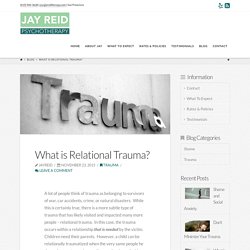
While this is certainly true, there is a more subtle type of trauma that has likely visited and impacted many more people – relational trauma. In this case, the trauma occurs within a relationship that is needed by the victim. Children need their parents. However, a child can be relationally traumatized when the very same people he depends upon to survive are the people who make him feel unsafe or deprived.
The child is forced to solve this dilemma usually by denying the reality of his trauma in favor of preserving the relationship to the parents. What is trauma? Trauma is complicated, layered and often cumulative in nature.
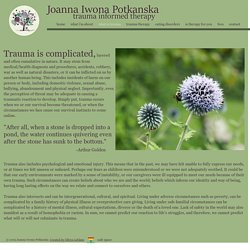
It may stem from medical/health diagnosis and procedures, accidents, robbery, war as well as natural disasters, or it can be inflicted on us by another human being. This includes incidents of harm on our person or body, including domestic violence, sexual abuse, bullying, abandonment and physical neglect. Importantly, even the perception of threat may be adequate in causing a traumatic reaction to develop. Simply put, trauma occurs when we or our survival become threatened, or when the circumstances we face cause our survival instincts to come online. "After all, when a stone is dropped into a pond, the water continues quivering even after the stone has sunk to the bottom.
" Spectrum Recovery Solutions. Trauma can be simply understood as hurt or harm to the body or the mind, or both.

We all experience traumas, and most of us have sufficient resilience, the ability to bounce back from stress, to be able to cope and to heal from the traumas we experience. Sometimes, though, the hurt or the harm overwhelms a person’s ability to cope and move on. This kind of trauma has lasting effects on the person, and their future ability to cope with stress is diminished. Physical traumas usually heal, and a scar may be the only evidence of that past wound. But psychological trauma can be difficult to see and often leaves invisible emotional scars. Traumatic experiences often involve a threat to life or safety, but any situation that leaves you feeling overwhelmed and alone can be traumatic, even if it doesn’t involve physical harm. Trauma Informed Care – NNHVIP. Browse:Home»Trauma Informed Care Trauma Informed Care Learn from the Expert Brooke Paskewich from the Philadelphia Headquarters sits down with Dr.
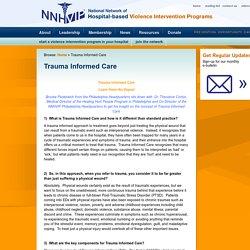
Theodore Corbin, Medical Director of the Healing Hurt People Program in Philadelphia and Co-Director of the NNHVIP Philadelphia Headquarters to get his insight on the concept of Trauma Informed Care. Childhood Trauma. What is Trauma - Operation Pegasus. Copy of Copy of What is Trauma? by Ilana Amrani-Cohen on Prezi. Life Unlimited. The word ‘trauma’ comes from the Greek term for ‘wound’.
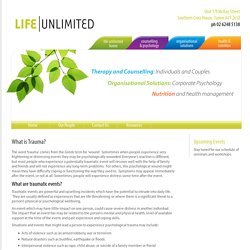
Sometimes when people experience very frightening or distressing events they may be psychologically wounded. Everyone’s reaction is different, but most people who experience a potentially traumatic event will recover well with the help of family and friends and will not experience any long-term problems. For others, this psychological wound might mean they have difficulty coping or functioning the way they used to. Symptoms may appear immediately after the event, or not at all. Sometimes, people will experience distress some time after the event. What are traumatic events? Traumatic events are powerful and upsetting incidents which have the potential to intrude into daily life. Shpa%20trauma informed%20webinar%201 25 13%201.
African American Babies Coalition. Trauma is a near universal experience.
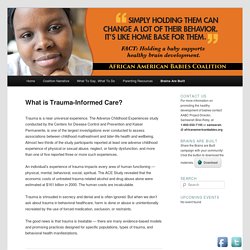
The Adverse Childhood Experiences study conducted by the Centers for Disease Control and Prevention and Kaiser Permanente, is one of the largest investigations ever conducted to assess associations between childhood maltreatment and later-life health and wellbeing. Almost two-thirds of the study participants reported at least one adverse childhood experience of physical or sexual abuse, neglect, or family dysfunction, and more than one of five reported three or more such experiences.
An individual’s experience of trauma impacts every area of human functioning — physical, mental, behavioral, social, spiritual. The ACE Study revealed that the economic costs of untreated trauma-related alcohol and drug abuse alone were estimated at $161 billion in 2000. The human costs are incalculable. What is Trauma? - Art Therapy Buffalo.
What is Trauma? “Trauma” is like no other experience. While historically it was defined as something out of the “normal” realm of human experience, today we understand that trauma is much more complex and that it deserves an expanded definition. Unfortunately for many, traumatic or adverse life experiences can happen repeatedly. What is Trauma Bonding? One thing often asked by those in the helping profession when confronted with a person in an unhealthy relationship is, “Why do you stay?” This question has implications of weakness and failure on the part of the victim and usually causes shame. Rather than asking this question of a victim of abuse, it is best for a counselor to understand the concept of trauma bonding, and explain it to the individual who seems “stuck” in a bad relationship.
Trauma bonding is loyalty to a person who is destructive. While the idea of bonding tends to bring up connotations of something good and beneficial, trauma bonds are unhealthy. According to Patrick Carnes, in his book, Betrayal Bonds, there are a number of signs that a person is involved in an unhealthy bond with a partner or other significant person. Usually trauma bonds occur in relationships involving inconsistent reinforcement, such as those with addicts and alcoholics or in domestic violence situations. What Is Trauma? Emotions and memories are stored in the body. We can try to forget, we can try to put it all behind us, but our bodies won't let us get away with that. This does not mean we need to sit and retell horrific stories repeatedly, rehashing painful details.
However, it does mean that integration and processing needs to happen somehow in order for healing to take place. I feel it's important not to push someone into talking about something they're not feeling ready to talk about, and that starting where someone is, right in the present moment is usually the best place to start. We can work on healing the past in the present moment, on creating a sense of stability and safety right now. What is tf cbt en us. Australian Psychological Society : Understanding and managing psychological trauma. << Return to Tip Sheet index The word ‘trauma' is derived from the Greek term for ‘wound'. Very frightening or distressing events may result in a psychological wound or injury - a difficulty in coping or functioning normally following a particular event or experience.
Everyone's reaction is different, but most people who experience a potentially traumatic event will recover well with the help of family and friends and will not experience any long-term problems. If people do develop problems, they may appear directly after the traumatic event or they may not emerge until much later.
What is a potentially traumatic event? Potentially traumatic events are powerful and upsetting incidents that intrude into daily life. The same event may have little impact on one person but cause severe distress in another individual. Trauma-Informed Approach and Trauma-Specific Interventions. Trauma-Informed Approach According to SAMHSA’s concept of a trauma-informed approach, “A program, organization, or system that is trauma-informed: Realizes the widespread impact of trauma and understands potential paths for recovery;Recognizes the signs and symptoms of trauma in clients, families, staff, and others involved with the system;Responds by fully integrating knowledge about trauma into policies, procedures, and practices; andSeeks to actively resist re-traumatization.
" A trauma-informed approach can be implemented in any type of service setting or organization and is distinct from trauma-specific interventions or treatments that are designed specifically to address the consequences of trauma and to facilitate healing. SAMHSA’s Six Key Principles of a Trauma-Informed Approach A trauma-informed approach reflects adherence to six key principles rather than a prescribed set of practices or procedures. What is Trauma - Bay Area Trauma Center.
Some events that happen to us as children or adults are so overwhelming and inherently frightening that they cause temporary, and in some cases permanent, changes in our physical and psychological responses to stress. European Society for Trauma and Dissociation. What is Head Trauma? By Sally Robertson, BSc Head trauma refers to any damage to the scalp, skull or brain caused by injury. Head injury may be classified in various different ways according to the type of injury, which structures in the head are damaged or how severe the trauma is.
Post-Traumatic Stress Disorder (PTSD) TF CBT 20Flyer 1. Trauma Symptoms. What is Trauma insurance? What is a Trauma Center > Trauma Care. Kids First Family Services. 4600 Kietzke Lane, Suite J212, Reno, NV 89502 Phone: (775) 348-9047 Fax: (775) 348-9524. Url?sa=t&rct=j&q=&esrc=s&source=web&cd=63&ved=0ahUKEwjLjf2z8uPKAhVFWSYKHaWtBic4PBAWCCcwAg&url= What is Trauma to the Future? on JSTOR. Trauma20120829. Mvtraumaservices.com - What is trauma? What is Trauma? ISTSS - What is Childhood Trauma? The word trauma is used to describe negative events that are emotionally painful and that overwhelm a person’s ability to cope. Examples of such events include experiencing an earthquake or hurricane, industrial accident or vehicular accident, physical or sexual assault, and various forms of abuse experienced during childhood.
Url?sa=t&rct=j&q=&esrc=s&source=web&cd=75&ved=0ahUKEwjd0bvO8uPKAhXFNSYKHQPCCEk4RhAWCDYwBA&url= What is Trauma? — Aurora Psychology. The above definition provides a simple but effective explanation of the term "trauma". It is common to think that a traumatic event has to be something that is serious and severe; however, many events in our lives have the potential to be traumatic. School of Psychology & Counseling. What%20is%20trauma final. Child and Parent Resource Institute. Is trauma and ICU the same thing as ER? If not, what is the difference? - Quora.
Trauma Through a Child's Eyes: Awakening the Ordinary Miracle of Healing - Peter A. Levine, Maggie Kline. What Is Trauma? What is PTSD? What is Trauma? - After Trauma. Pdx Trauma Free Counseling. What is Trauma? What is traumatic brain injury (TBI)? What causes traumatic brain injury? What is Trauma — Simcoe Trauma Recovery Clinic. Trauma Centre Australia. Breaking Free Foundation. Partnership for Trauma Recovery. Untitled Document. What is Trauma? - Alyssa Stines, LCSW, CSAT. About therapy: what is trauma, symptoms, self regulation, and healing. UF Health, University of Florida Health. What is Trauma? - Trauma Informed Oregon.
What is Trauma? What is Trauma? - TeachTrauma. American Friends of Natal » What is Trauma? What Is Trauma Therapy? What is Trauma? « Intensive Trauma Therapy. What Is Trauma? Connectivity Counselling. What is trauma care? American Society of Anesthesiologists - What is trauma. Trauma System Agenda for the Future: What Is A Trauma System. What is TF-CBT? Suncorp Insurance Quotes. What is Trauma? — UVA Health System. Trauma Bonding: What Is a Trauma Bond? What is Trauma? - PA Trauma Systems Foundation. Trauma 001. ODVN Trauma and You May 2013. What is trauma? Untitled. What is trauma? What is social trauma? Psychological / Emotional Trauma: an overview. Trauma. CmhereviewMar10. What Is Child Traumatic Stress? What Is Trauma? Psychological trauma. What Is Trauma? Signs and Symptoms of Trauma – Causes and Effects. National Child Traumatic Stress Network - Child Trauma Home. What Is Psychological Trauma? Trauma and Shock. Center for Nonviolence and Social Justice.
Immigration trauma. 11559 Chapter 1. Emotional and Psychological Trauma: Symptoms, Treatment, and Recovery.